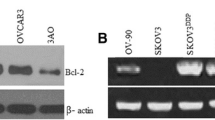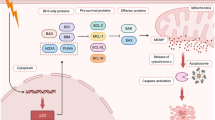Abstract
A reduced capacity for apoptosis induction is considered to play a significant role both in the development of malignancy and in tumor cell resistance to chemotherapeutic drugs. The Bcl-2 oncoprotein inhibits apoptosis induced by antitumor agents at a point downstream of drug-target interactions. Stable expression of Bcl-2 in the human epithelial tumor (HeLa) cell line results in inhibition of apoptosis following exposure to the topoisomerase II poison, etoposide. However, Bcl-2 is unable to enhance clonogenic survival as a result of alternate pathways to reproductive death induced by the drug. Purpose: The purpose of this study was to further investigate the role of Bcl-2 in human epithelial tumor cell drug resistance using 5-fluoro-2′-deoxyuridine, staurosporine, and doxorubicin, in addition to etoposide. Methods: The ability of Bcl-2 to enhance clonogenic cell survival was studied by colony-forming assays, while delay of cell death induction was assessed by trypan blue viability measurements. The proportion of apoptotic cells was measured by morphological criteria, as well as detection of apoptotic DNA fragmentation using the terminal deoxynucleotidyl transferase assay. Results: Despite profound inhibition to loss of plasma membrane integrity for all agents tested, Bcl-2 was only able to significantly increase clonogenic survival following exposure to 5-fluoro-2′-deoxyuridine and staurosporine, but not following exposure to etoposide or doxorubicin. Furthermore, the time-course of apoptosis induction following exposure of HeLa cells to equitoxic concentrations of staurosporine and etoposide was profoundly different. Conclusions: These results indicate that Bcl-2 enhances clonogenic survival of human epithelial tumor cells in an agent-specific fashion, which may be determined by the initial cytotoxic lesion induced by a particular drug.
Similar content being viewed by others
Author information
Authors and Affiliations
Additional information
Received: 15 July 1997 / Accepted: 8 October 1997
Rights and permissions
About this article
Cite this article
Elliott, M., Stribinskiene, L. & Lock, R. Expression of Bcl-2 in human epithelial tumor (HeLa) cells enhances clonogenic survival following exposure to 5-fluoro-2′-deoxyuridine or staurosporine, but not following exposure to etoposide or doxorubicin. Cancer Chemother Pharmacol 41, 457–463 (1998). https://doi.org/10.1007/s002800050767
Issue Date:
DOI: https://doi.org/10.1007/s002800050767




